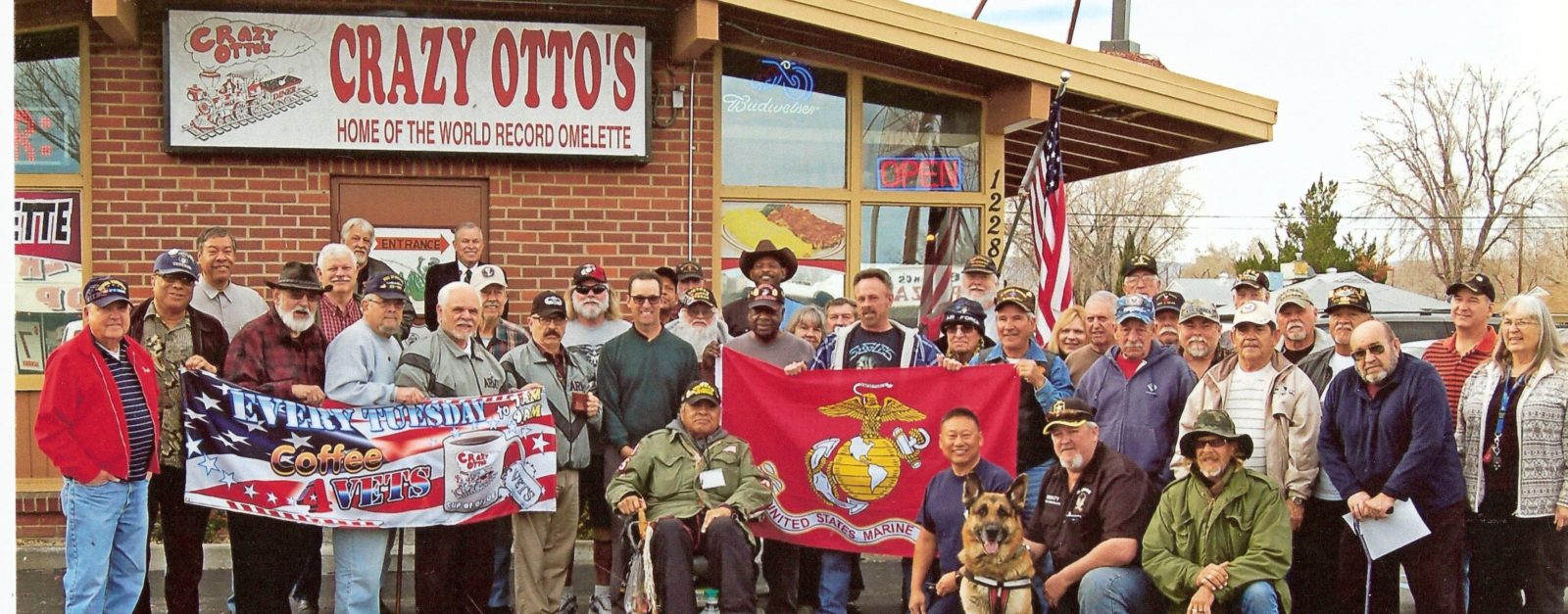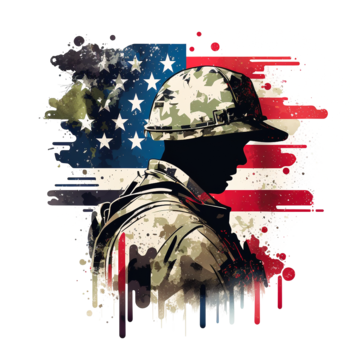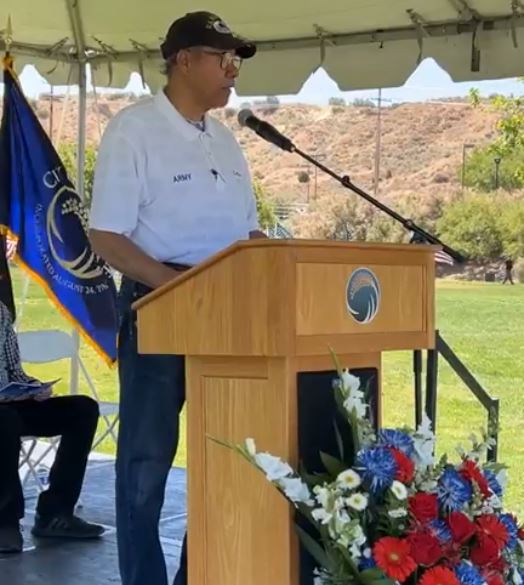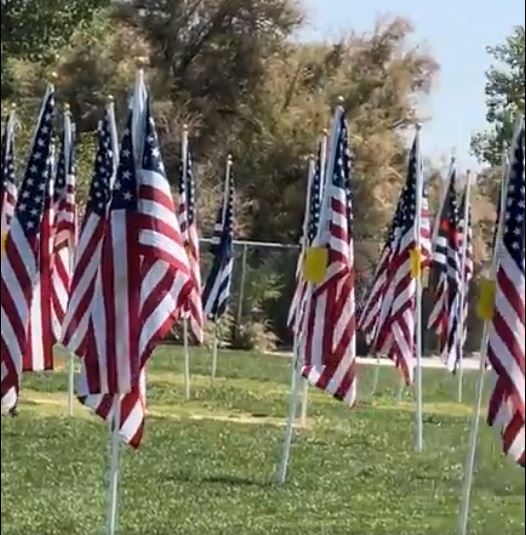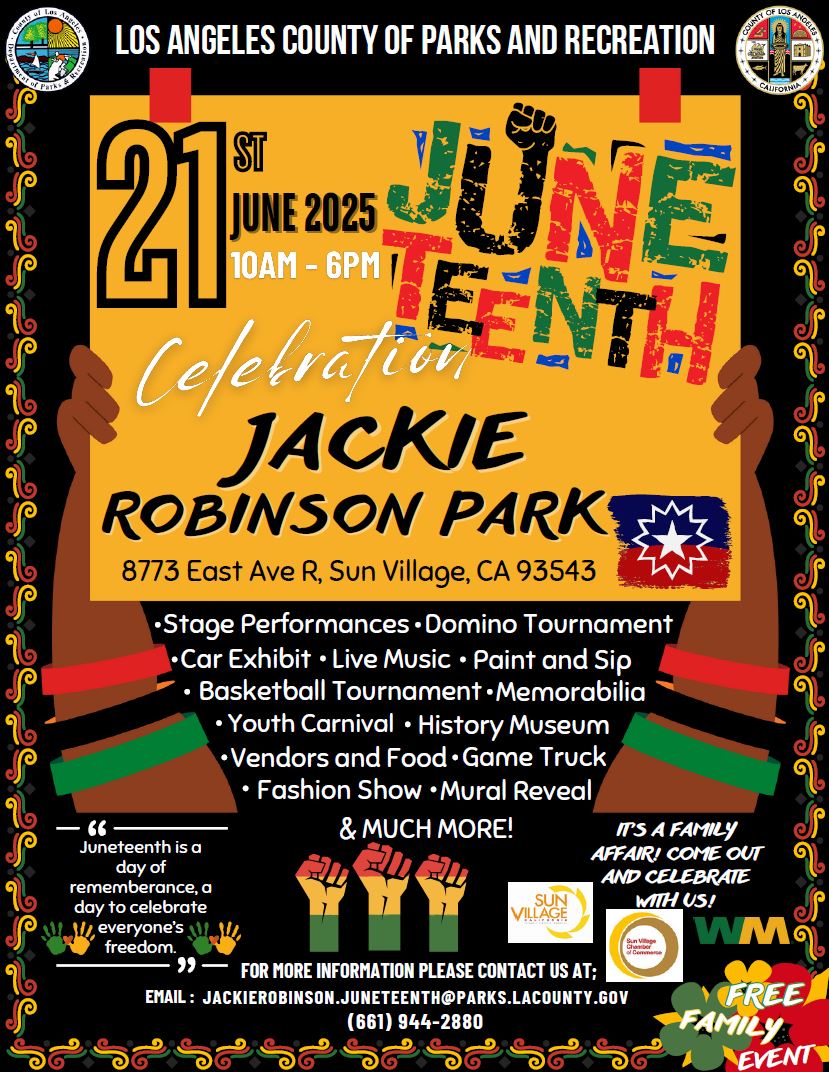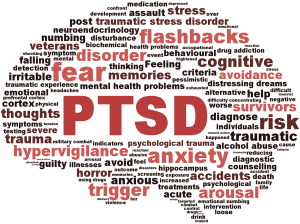

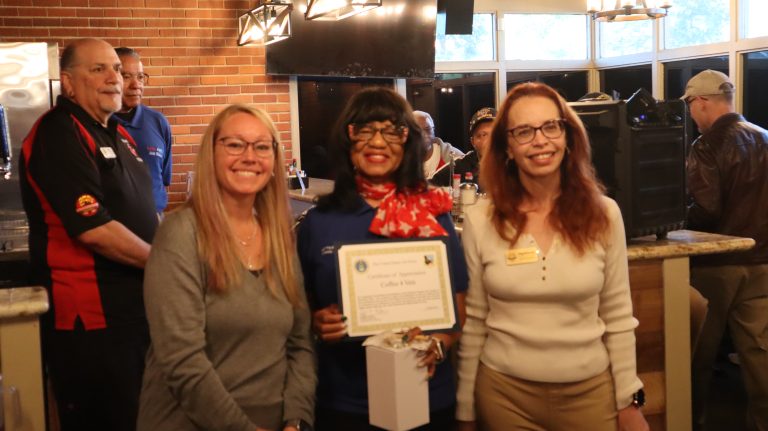
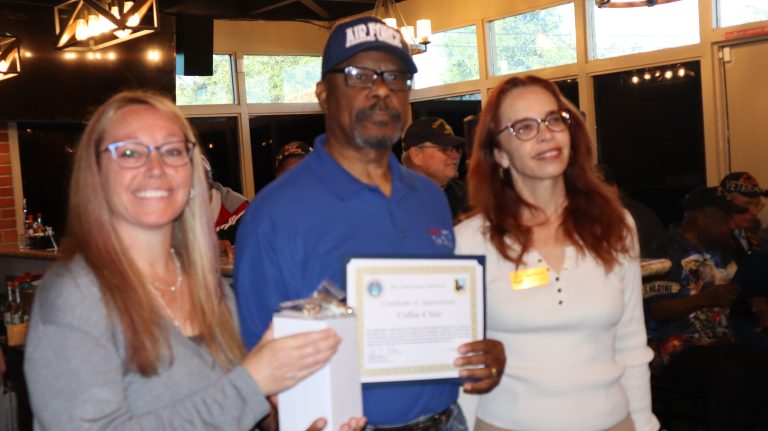
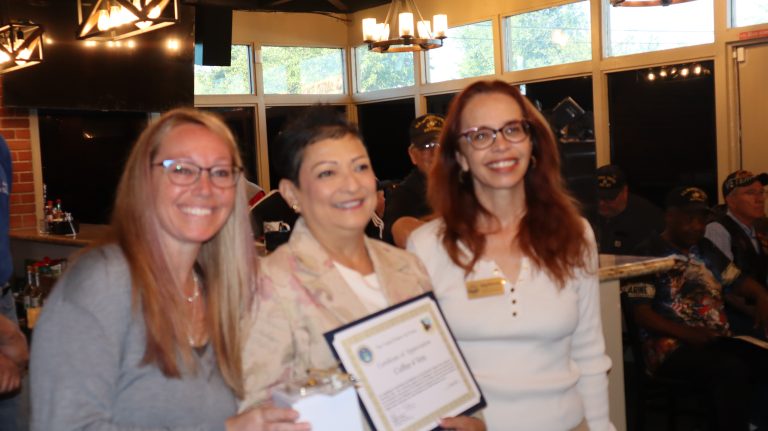
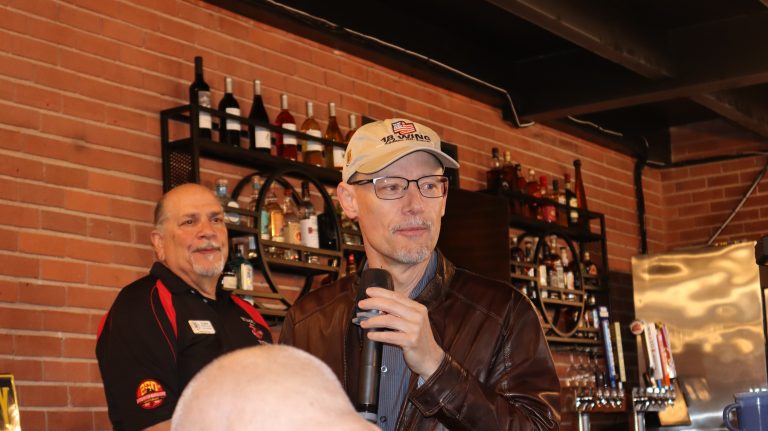
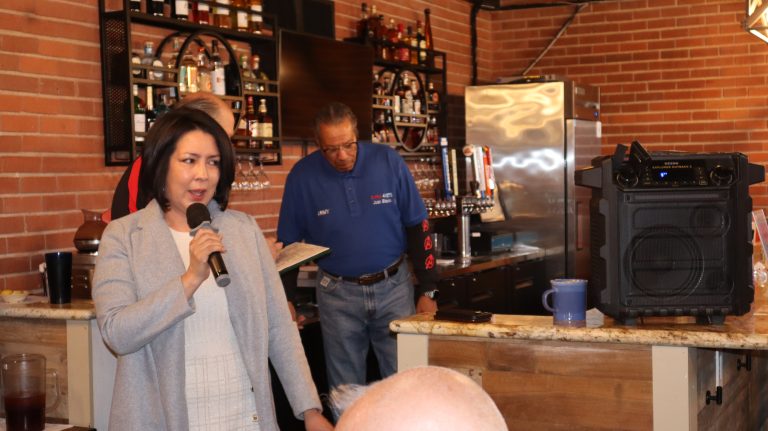
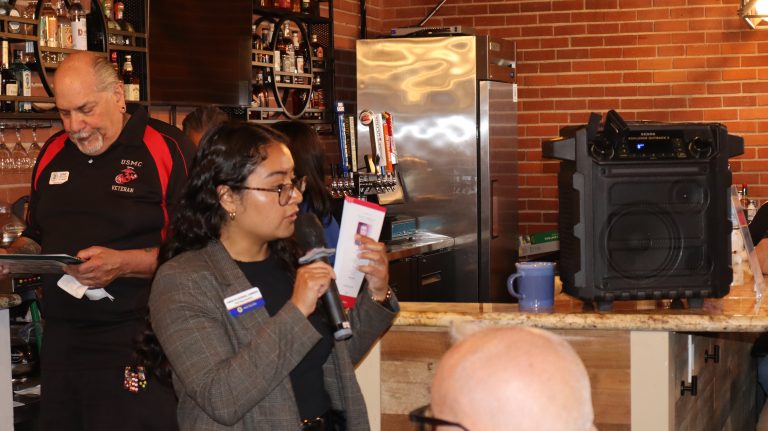
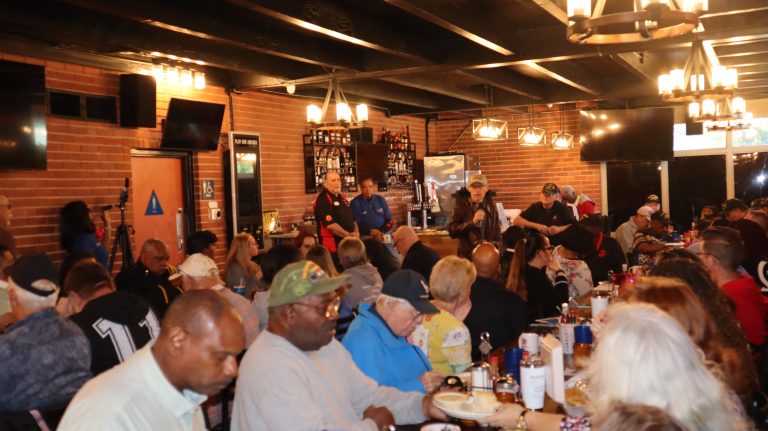
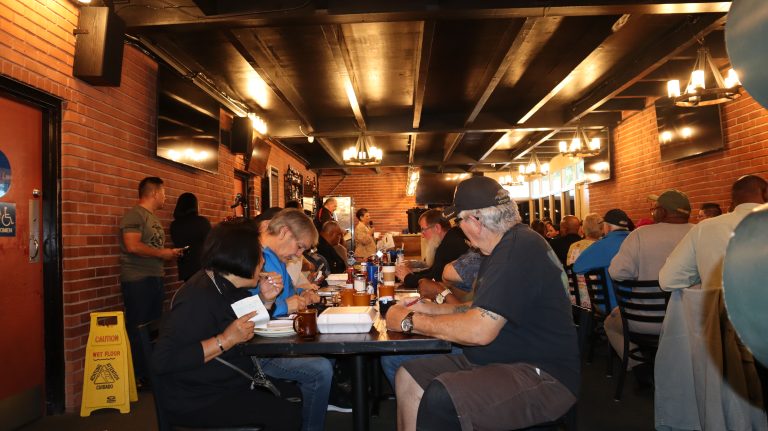
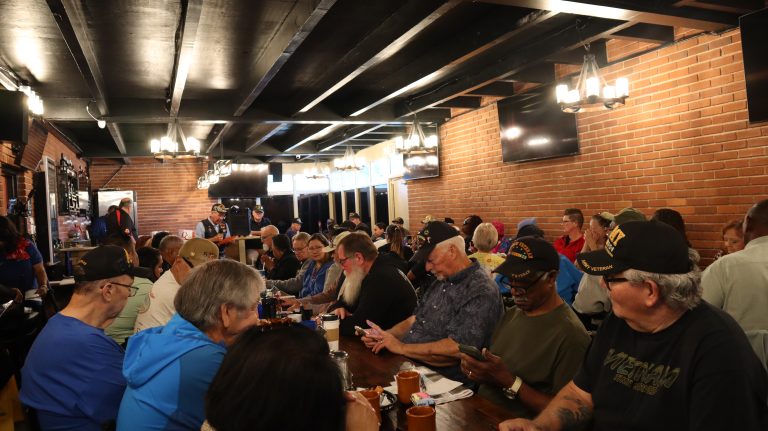
PTSD Awareness Month
Issue No. 002 - June 2025
Understanding PTSD
 Post-traumatic stress disorder (PTSD) is a chronic, and often times debilitating mental health disorder that affects 6% of Americans. PSTD is far more common among Veterans and depending on their service era, 11% – 23% of veterans experiences PTSD annually. Ref: Post-Traumatic Stress Disorder (PTSD) Statistics: 2024 Update. The Center for Advancing Health
Post-traumatic stress disorder (PTSD) is a chronic, and often times debilitating mental health disorder that affects 6% of Americans. PSTD is far more common among Veterans and depending on their service era, 11% – 23% of veterans experiences PTSD annually. Ref: Post-Traumatic Stress Disorder (PTSD) Statistics: 2024 Update. The Center for Advancing Health
What is PTSD?
The US Department of Veteran Affairs defines PTSD as “a mental health problem that can develop after you go through or see a life-threatening event.” Ref: How Common is PTSD in Veterans? – PTSD: National Center for PTSD
The Mayo Clinic defines PTSD as “a mental health condition that’s caused by an extremely stressful or terrifying event – either being part of or witnessing it.” Ref: Post Traumatic stress disorder (PTSD)
Symptoms of PTSD Ref: PTSD Basics
PTSD is often marked by various symptoms. While each person can experience symptoms in their own way, symptoms can appear immediately after the traumatic event or they can appear months, possibly even years later.
PTSD is characterized by the following 4 types of symptoms.
Reliving the Event (Re-Experiencing) – Flashbacks, nightmares, seeing, hearing, or smelling something that causes a person to relive the traumatic event are just a few things that can trigger this symptom.
Avoidance –This symptom causes a person to avoid people, situations, anything that reminds the person of the trauma of the event.
Negative Thoughts and Feelings – A person with PTSD will experience more negative thoughts and feelings causing depression, guilt, detachment from loved ones, a lose of interest in things that used to bring happiness.
Feeling on Edge/Keyed Up (Hyperarousal) – PTSD can cause a person to feel jittery, the need to be on alert, looking out for danger, become angry, lose sleep, to act in an unhealthy manner such as substance abuse.
Treatment
Post-traumatic stress disorder is a severe, widespread issue that is pervasive among veterans that can disrupts their lives. As PTSD becomes better understood, treatments are more readily available. If you or someone you know suffers from PTSD there is help. Contact:
Veterans Crisis Line: Call 988 then Press 1 or Text: 838255
Call, Text, Online Chat – Free and confidential resource for Veterans and their family and friends. Speak to trained responders 24/7.
Crisis Text Line – Text HOME to 741741
Text and Online – Volunteer based service offering 24/7 free support and help.
National Alliance on Mental Illness – Call 1-800-950-6264 or Text “helpline” to 62640
Call, text, or chat available M-F, 10 a.m. – 10 p.m. ET – To find support for your loved ones. Also offers a Family-to-Family Education Program for caregivers of people with mental illness.
US Department of Veterans Affairs – Call 1-800-692-2411 and select “0” to connect with an agent.
Did You Know
Over 17 Million Veterans
 There are over 17 million Veterans in the U.S.
There are over 17 million Veterans in the U.S.
Source: U.S Department of Veteran Affairs
Veterans Population (2024)
(Period Served Report)
WWII - 58,182
Korean Conflict - 392,918
WWII & Korean Conflict - 5,185
Vietnam Era - 4,734,810
WWII, Korean Conflict, & Vietnam Era - 2,775
First Gulf War - 2,751,942
Vietnam Era & First Guld War - 254,469
Second Gulf War - 4,209,227
Vietnam Era, First Gulf War, & Second Guld War - 52,350
California is home to 1,474,934 Veterans.
Veterans & PTSD
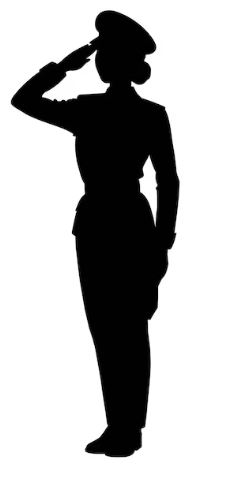 Over 1.4 Million reported cases of PTSD among Veterans.
Over 1.4 Million reported cases of PTSD among Veterans.
Source: U.S Department of Veterans Affairs
Veteran Population (2024)
(Age/Sex Report)
Male Veterans - 15,821,240
Female Veterans - 2,100,001
Women are 2x mores likely to develop PTSD than men.
PTSD in Veterans
Source: U.S. of Veterans Affairs
13% of Female Veterans will have PTSD in their lifetime.
6% Of Male Veterans will have PTSD in their lifetime.
Affects of PTSD
HALF of Veterans with PTSD Seek Treatment.
Only 20% who seek treatment complete it.
20% Struggle with Substance Abuse
More than 1/5 of reported domestic violence cases involve a combat veteran.
Risk for suicide is 21% higher among Veterans than U.S. civilians.
22 Veterans commit suicide EACH DAY.
PTSD Support
 Veterans Crisis Line: Call 988 then Press 1 or Text: 838255
Veterans Crisis Line: Call 988 then Press 1 or Text: 838255
Call, Text, Online Chat – Free and confidential resource for Veterans and their family and friends. Speak to trained responders 24/7.
Crisis Text Line – Text HOME to 741741
Text and Online – Volunteer based service offering 24/7 free support and help.
National Alliance on Mental Illness – Call 1-800-950-6264 or Text “helpline” to 62640
Call, text, or chat available M-F, 10 a.m. – 10 p.m. ET – To find support for your loved ones. Also offers a Family-to-Family Education Program for caregivers of people with mental illness.
US Department of Veterans Affairs – Call 1-800-692-2411 and select “0” to connect with an agent.
Vet Talk
Vet Talk is the brainchild of Juan Blanco, Coffee4VETS’ founder and president. Juan started Vet Talk during the pandemic as a way to help veterans work through the difficulties of being isolated, sheltering at home, and social distancing. Vet Talk became crucial in keeping the veteran community connected.
In continuing with the same spirit of keeping the veteran community connected. Vet Talk is being relaunched. The series will feature 1 monthly question answered by our Veteran community. The monthly question will cover a broad scope of topics, ranging from their lives before, during, and after service.
A special Thank You to GySGT E-7 James Mumma, USMC (Retired), PFC E-3 William Puckett, U.S Army (Retired), and SGT Tony Tortolano, U.S Marine Corps (Retired) for your service and for taking the time to answer this month’s question.
This month’s question is: What did you find to be the most challenging part of your transition back to civilian life? How did you overcome it?
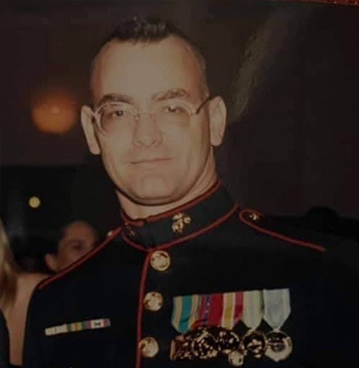 "The most difficult part of the transition was getting linked to services and resources.
"The most difficult part of the transition was getting linked to services and resources.
The process was through other homeless Veterans...Just in communication, just talking, word of mouth. One thing led to another say "Hey, you might want to go down to the VA and take your DD214 down there and they could upload it."
I had no clue as to the resource but once that was explained to me, then I went down to the VA gave them my DD214. That process started from there. And due to the VA that kind of started my journey to becoming housed."
U.S Marine Corps: 1985-1998
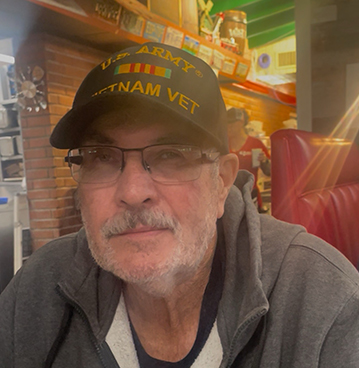 "I was a medic. I really wanted to go to medical school. They wanted me to sign up, "Oh, sign up for another 4 years or so and we'll get you into medical school." And so, 2 days before I was going to get out, I say "Ok I need to see the paperwork. Where are you going to send me to medical school?" And I never saw it. They never got back with me. So, I ...The last day I went and asked, "Where's the paperwork?" And, "Oh, we're still working on it. But we still need you to sign this." Naw, that ain't...it's not gonna happen. So, I went and got out. And life happens. And I never really got a chance to do what I wanted to do and get married and have kids. Once I got out, I'll be honest with you before I joined the military, I was homeless. So um...They kind of straightened me out too. Because I was kind of wild, kind of thing. The Army did help me from that aspect. Taught me values that I was able to use. And I kind of had my head on pretty straight when I got out. And it made for a smoother transition.
"I was a medic. I really wanted to go to medical school. They wanted me to sign up, "Oh, sign up for another 4 years or so and we'll get you into medical school." And so, 2 days before I was going to get out, I say "Ok I need to see the paperwork. Where are you going to send me to medical school?" And I never saw it. They never got back with me. So, I ...The last day I went and asked, "Where's the paperwork?" And, "Oh, we're still working on it. But we still need you to sign this." Naw, that ain't...it's not gonna happen. So, I went and got out. And life happens. And I never really got a chance to do what I wanted to do and get married and have kids. Once I got out, I'll be honest with you before I joined the military, I was homeless. So um...They kind of straightened me out too. Because I was kind of wild, kind of thing. The Army did help me from that aspect. Taught me values that I was able to use. And I kind of had my head on pretty straight when I got out. And it made for a smoother transition.
U.S Army: Dec. 1971 - July 1973
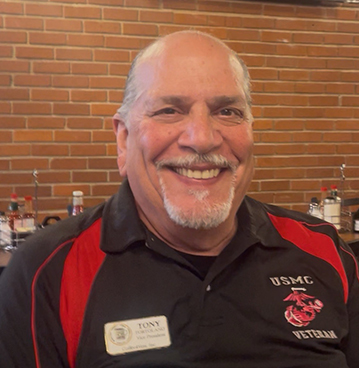 "I wasn't really... I was always kind of like ... cause I was in the Reserves. So I was always in civilian life already anyway. So ... it didn't affect me like the other guys who are in active duty all the time. So I was always kind of like one foot in the military. That's why I do what I do, cause I didn't go through what they went through. I wasn't in combat, these were the Regan years. Like Grenada and Panama, that's about it."
"I wasn't really... I was always kind of like ... cause I was in the Reserves. So I was always in civilian life already anyway. So ... it didn't affect me like the other guys who are in active duty all the time. So I was always kind of like one foot in the military. That's why I do what I do, cause I didn't go through what they went through. I wasn't in combat, these were the Regan years. Like Grenada and Panama, that's about it."
U.S Marine Corps. Feb. 1981 - Mar. 1987
President's Message
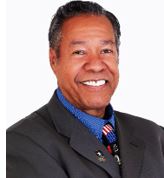
Welcome to Coffee4VETS June Newsletter.
In May we celebrated Military month with the Birthday of WWII Fighter Pilot Kenneth Placid who turned 102 on the 15th at our Santa Clarita Crazy Otto’s, participated with the City of Palmdale’s Honor Field celebrating the Holiday and we hosted the Memorial Day BBQ on the 31st at the Lancaster Elks Lodge in honor of LCMDR Walter Sapp, US Coast Guard.
This month of June, we celebrate the US Army, on 250 years of service. We will all so celebrate Flag Day along with Juneteenth, the day the emancipation Proclamation reached the slaves in the state of Taxes.
Our Moto: “Honoring Our Veterans of Yesterday Who Secured Our Today.”
Our Purpose: Pride of Service
Highlight of The Month
May 2025
Field of Honor
Field of Honor Memorial Day 2025 presented by City of Palmdale.
Save the Date
We Invite You to Join Us
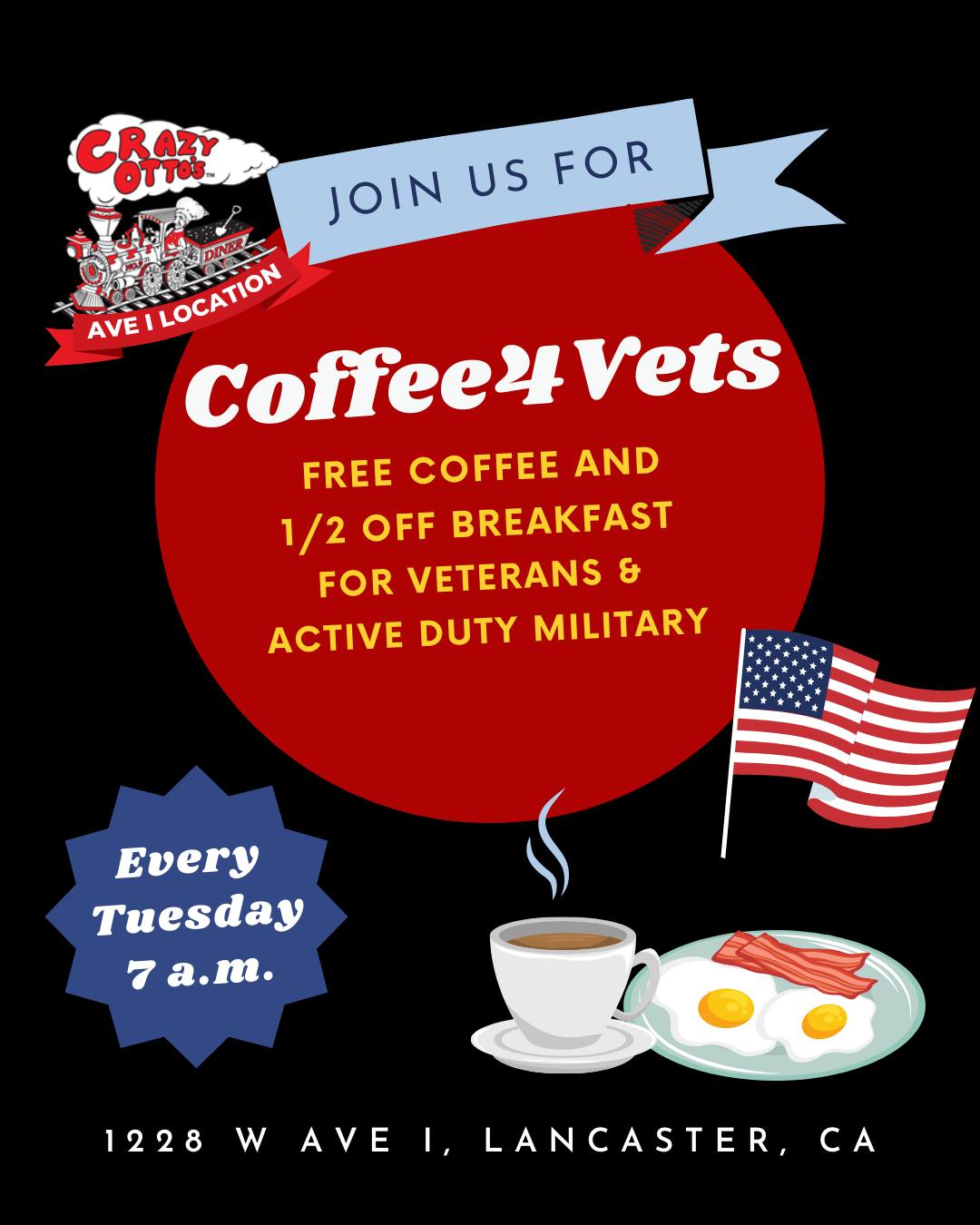
Join us for our weekly Coffee4VETS event! Veterans and active-duty military can enjoy FREE coffee and 1/2 off breakfast!
Date: Every Tuesday
Time: 7 A.M – 9 A.M
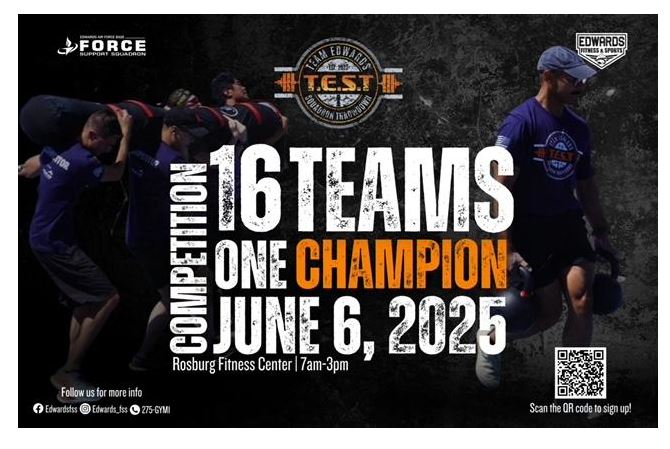 The teams are in for the 3rd annual Team Edwards Squadron Throwdown!
The teams are in for the 3rd annual Team Edwards Squadron Throwdown!
Save the date to come out and cheer on your squadron!
There will be food trucks, prize drawings, sponsor booths, and more!
DATE: Friday, June 6, 2025
TIME: 7 am – 3 pm
WHERE: Rosburg Fitness Center
Click on link for more info: Squadron Throwdown
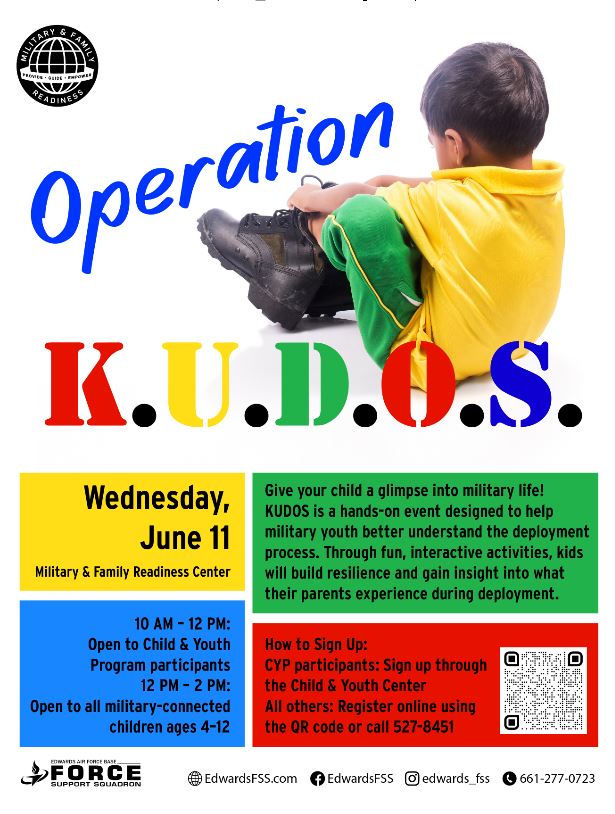
Operation KUDOS lets children get a better understanding of the deployment experience Airmen may undergo.
DATE: Wednesday, June 11, 2025
TIME: 10 am – 12 pm – Open to Child & Youth Program Participants
12 pm – 2 pm – Open to all military connected children ages 4-12
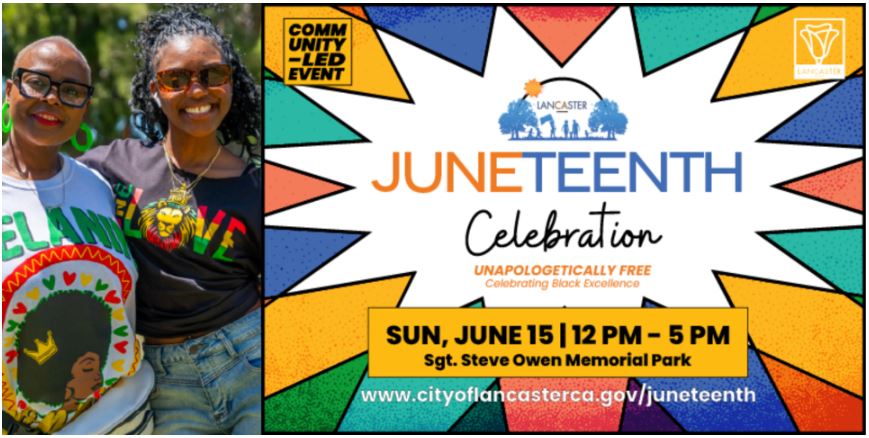
Date: June 15, 2025
Time: 12 P.M – 5 P.M
Where: Sgt. Steve Owen Memorial Park
Click on the link for more details: Lancaster Juneteenth Celebration
Happy Birthday
A Very Happy Birthday from Coffee4VETS!
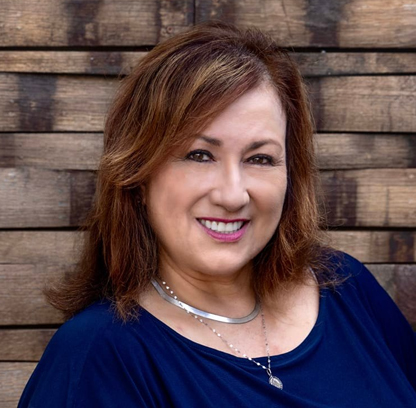
Sandra Avery
June 1
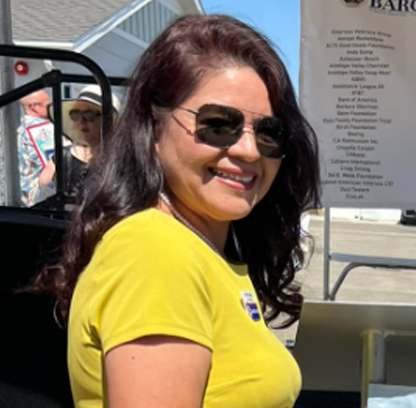
Vicky Ventura
June 7
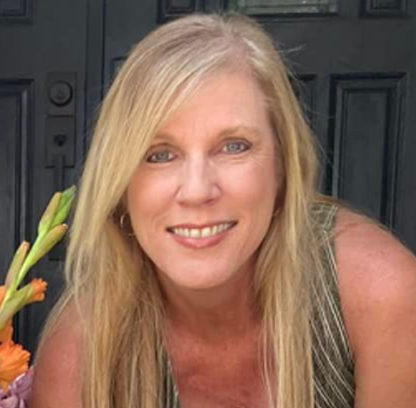
Denise Smith
June 11
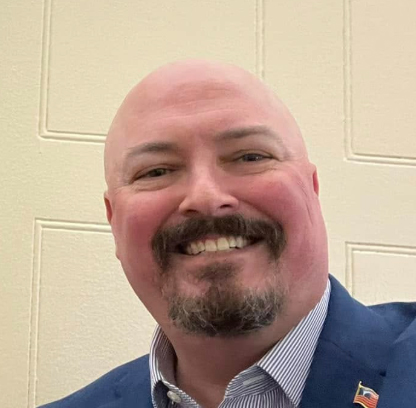
Drew Mercy
June 15
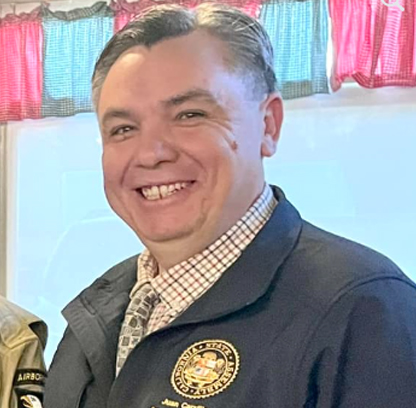
Juan Carillo
June 23
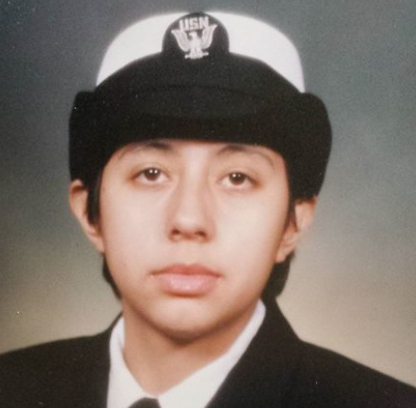
Liz Robertson
June 28
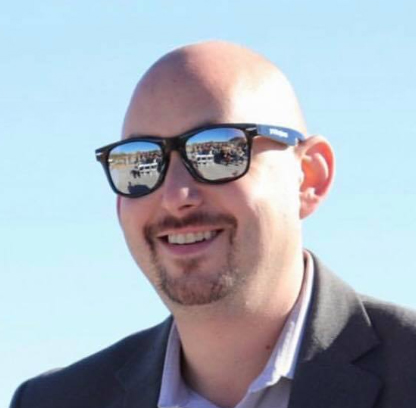
Austin Bishop
June 28
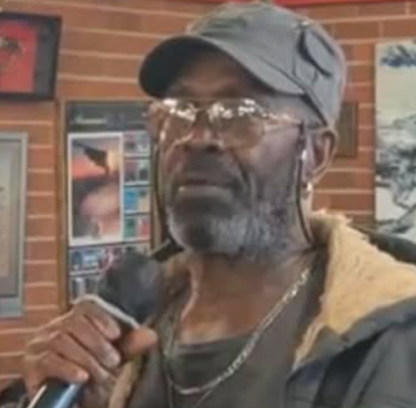
Eddie Bedford III
June 28
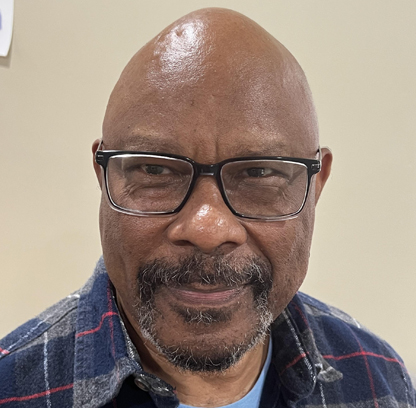
Glen Campbell
June 30
June observances
Mark Your Calendars
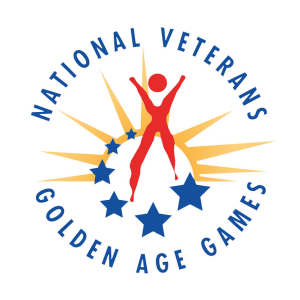
Veterans Golden Age Games – The National Veterans Golden Age Games is a multi-event sports competition designed to enhance the health and quality of life for older veterans aged 55 and over.
PTSD Awareness Month
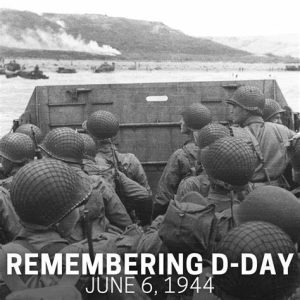
D-Day
D-Day was the name given to the June 6, 1944, invasion of the beaches at Normandy in northern France by troops from the United States, Canada, the United Kingdom and other countries during World War II.
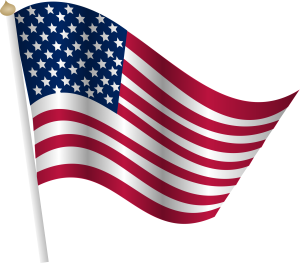
National Flag Week
A day for all Americans to celebrate and honor the flag, its designers, and its makers.
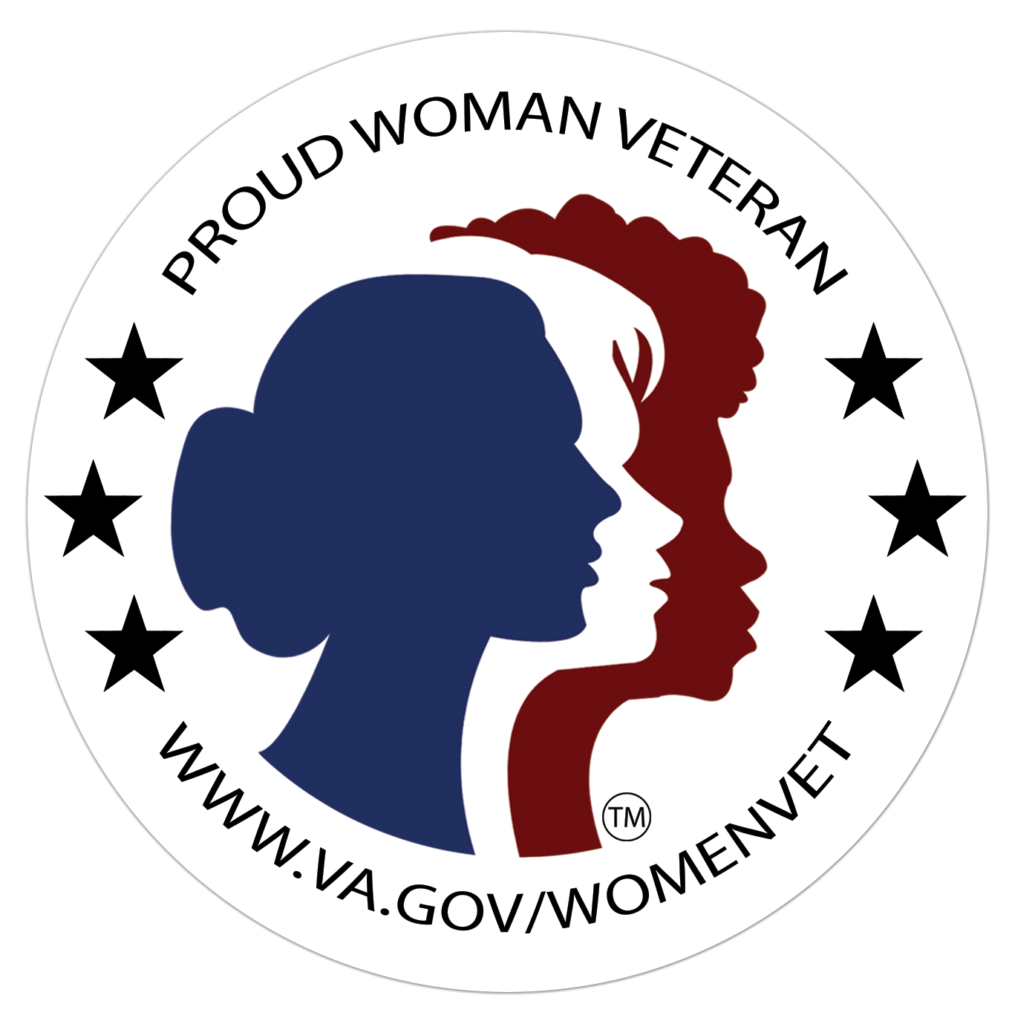
Women Veterans Day
The day was signed into law by President Harry S. Truman on June 12, 1948. Prior to then, only women nurses could serve in the regular and reserve forces during peacetime.
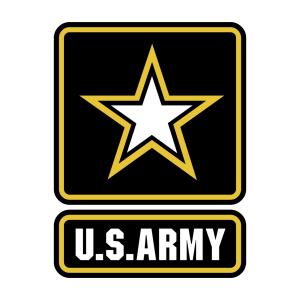 Army Birthday
Army Birthday
The US Army was founded on 14 June 1775, when the Continental Congress authorized enlistment of riflemen to serve the United Colonies for one year. Henceforth, “the American continental army” and commissioned then Colonel Washington to the rank of General in which to lead this continental army and the birth of the United States Army.
U.S Flag Day 
On June 14, 1777, the Continental Congress passed a resolution defining the colors, configuration, and symbolism of the Stars and Stripes, AKA The American Flag. The text: “that the flag of the United States shall be of thirteen stripes of alternate red and white, with a union of thirteen stars of white in a blue field, representing the new constellation.” Ther are some sources that report the first historically recognition call for an official Flag Day observance happened in 1861 however it wasn’t until 1949 that Congress would approve the holiday and Flag Day was signed into law by President Harry Truman.

Father’s Day Thank You to all the dads for all that you do.
 Juneteenth
Juneteenth
Slavery in the United States can be traced back to the 16th century when Spanish explorers brought African slaves with them to the New World. It lasted until the Emancipation Proclamation came into effect on January 1, 1863. On that date Texas was largely controlled by forces fighting for the Confederate States, which opposed the abolition of slavery.
On June 19, 1865, Union soldiers arrived to take control of Texas and enforce the emancipation of slaves in the state. In Galveston, Texas, the newly freed slaves held large public celebrations and so laid the base for future Juneteenth activities. The word ‘Juneteenth’ resulted from the words ‘June Nineteenth’ being combined together in speech. In 2021 Juneteenth became a national holiday
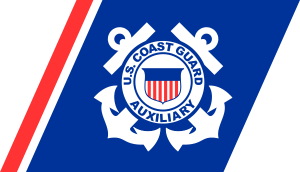
Coast Guard Auxiliary Birthday
Born out of Congressional authorization to create the Coast Guard’s “Volunteer Reserve” force in 1939 and then further defined in U.S. Code in 1941, the Coast Guard Auxiliary and its talented and devoted uniformed volunteer workforce has supported Coast Guard missions along our nation’s coasts and inland lakes and rivers.
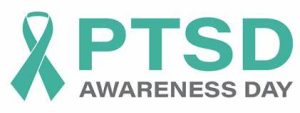 PTSD Awareness Day
PTSD Awareness Day
Officially designated in 2010 by the United States Senate with Senate Resolution 541 of the 111th Congress dedicated the day to create awareness about PTSD.
Coffee4VETS, Inc. is a 501c(3) non-profit organization that operates by the generous donations from individuals and other non-profit organizations. Thank you for visiting our page.
